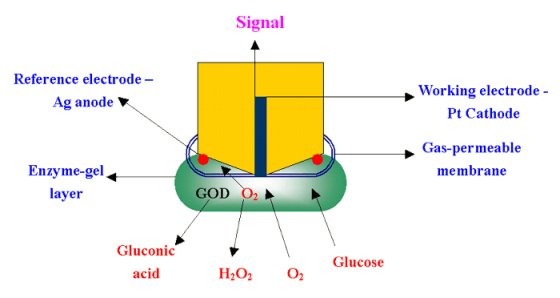Biosensor & DNA Chips
Biosensors
High degree of specificity exhibited by the actions of enzymes, antibodies & membrane receptors offers a potential for developing sensors or detectors.
These biosensors or detectors can be used to detect extremely low levels of proteins, hormones, pollutants, gases and other molecules.
Model of biosensor
Applications of Biosensor
1. Assist doctors in making rapid diagnosis (e.g. cancer & diabetes)
2. Permit rapid detection & measurement of acids, alcohols,& phenols
3. Be able to detect small amount of drugs in humans, enabling police & doctors in assessing drug abuse
4. Detect pathogens/carcinogens in monitoring the environment
5. Analyse food safety & processing
How Biosensors work?
Case Study: Implanted Glucose Biosensor
An implanted glucose biosensor is developed to monitor blood glucose in place of finger sticks for diabetes patients.
It utilizes an enzyme specific for glucose & provides a significatly accurate glucose measurement.
This wearable beeper-sized device is about the size of a cardiac pacemaker. It provides continuous and accurate monitoring of blood glucose with digital readout displays.
It can be linked to an implanted insulin pump creating a closed-loop mechanical pancreas.
Model of Glucose Biosensor

Reference
http://www.sybd.com/GB.html
DNA Chips
DNA Chips are a revolutionary step in molecular biology.
They are finding applications throughout the field of molecular biology.
Classification of DNA Chips
The DNA chips are also called:
DNA chip, DNA microchip, Gene Chip, DNA array, DNA microarray, biochip
Types of DNA Chips:
- 2-Dimensional DNA Chip (on-chip) -> DNA Microarray
- 3-Dimensional DNA Chip (in-chip) -> Lab-on-ChipHow Do DNA Chips work?
Applications of DNA Chips
Clinical Diagnosis
Environmental Monitoring - Genetic diseases
- Cancer diagnosis & prognosis
- Detection of viruses & bacteria
- Drug-resistant microbial typing- Environmental Monitoring
- Detection of pathogens/carcinogens
- Food safety & processingDrug Discovery
Biomedical Research - Simultaneous analysis of thousands of genes
- Screening of drug molecules- Differential gene display/mutation detection
- Discovery of new genes
- Functional genomic studyCase Study E.coli O157:H7 Quick DNA Chip
An easy way to know if your product is contaminated by a kind of pathogen E.coli O157:H7. (Product of Genolife)
Reference
Genolife - DNA chips (http://www.genolife.com/qdna.htm)Human Genome Project - HGP
- Approximately 50,000
- 100,000 genes 3 billion base pairsWhat is HGP?
- An international research program (1988 - 2003)
- To construct detailed genetic and physical maps of the human genomeTarget of HGP
- To determine the complete nucleotide sequence of human DNA by 2003
- To determine all the functional genomics
- To perform similar analysis on the genomes of several other organismsReference
1. National Human Genome Research Institute
(http://www.nhgri.nih.gov/index.html)
2. Human Genome Resources
(http://www.ncbi.nlm.nih.gov/genome/guide/)
Copyright(c)2002 HKIEd. All Rights Reserved.
請採用 Internet Explorer 4.0 或 Netscape Navigator 4.0 或以上瀏覽器,並以800x600解析度瀏覽。
